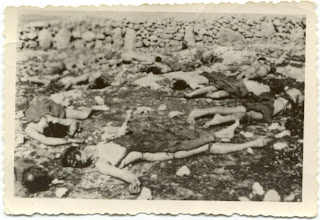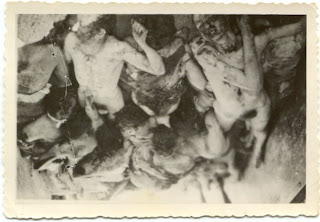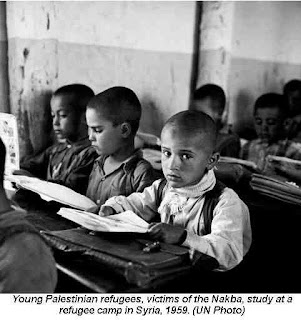


 It is a sign of Israel’s political degeneration and how the mask of liberalism has slipped that a law has been passed which criminalises and denies funding to any organisation or group that commemorates the Nakba, the expulsion of some ¾ million Palestinian Arabs into neighbouring countries.
It is a sign of Israel’s political degeneration and how the mask of liberalism has slipped that a law has been passed which criminalises and denies funding to any organisation or group that commemorates the Nakba, the expulsion of some ¾ million Palestinian Arabs into neighbouring countries.
There was a time when Israel attempted to pretend that the Palestinians hadn’t been expelled, they’d merely run away on orders! Indeed the young Israeli state had done its best to get them to stay (always citing the solitary example of an appeal by Haifa’s Jewish mayor to the Arabs in the city, even as the Labour Zionist militia Hagannah and the Revisionist Irgun were doing their best to terrorist them to leave).
But we should also understand that this law is the product, not of strength but weakness. As the Palestinian solidarity movement has grown stronger internationally and as Israel’s Arab population has become more organised and politically conscious, the Israeli state feels its only course of action is to ban that which they cannot defeat ideologically.
The new law is a sign that Zionism no longer has confidence in its own message and has to seek to outlaw the thoughts and memories of its victims. Below is an excellent article on this from the Electronic Intifada.
Tony Greenstein
Israel criminalizes commemoration of the Nakba
Jillian Kestler-D’Amours, The Electronic Intifada, 29 March 2011
A bill was passed by the Israeli Knesset (parliament) last week which calls on the government to deny funding to any organization, institution or municipality that commemorates the founding of the Israeli state as a day of mourning. The bill has become known as the “Nakba bill,” referring to the ethnic cleansing of historic Palestine during and before the establishment of the State of Israel in 1947-48.
“Law will not influence the way we commemorate the Nakba,” Haneen Zoabi, Palestinian member of the Knesset, told The Electronic Intifada. “On the contrary, we must prove to our people and to the state that we will not be afraid from this law and that this will not succeed in oppressing our feeling or our identity. We will commemorate the Nakba in a much more impressive way this year than we ever did.”
“This is a kind of law to control our memory, to control our collective memory. It’s a very stupid law which punishes our feelings. It seems that the history of the victim is threatening the Zionist state,” Zoabi said.
Elected in 2009, Zoabi represents the Balad party (National Democratic Alliance) and is the first woman to be elected on the list of an Arab party in Israel. She was one of 25 members of the Israeli Knesset (MKs) to vote against the bill on 22 March, compared to 37 MKs who voted in favor of it.
“The Nakba is not just part of the Palestinian history,” Zoabi explained. “It’s also part of the Jewish history of this land. Because you need two in order to make Nakba. You need the victim and you need the oppressor. It was the Israelis who expelled the Palestinians and destroyed their towns and their villages and stole their land.”
The original version of the bill — which was subsequently changed due to widespread condemnation — called for putting any individual who publicly commemorates the Palestinian Nakba in jail for three years.
The purpose of the bill is to prevent members of the Arab minority in Israel from exercising their democratic right to commemorate a seminal event in their history. This legislation will cause harm to cultural and educational institutions that teach about the Nakba by cutting their funding and will further entrench inequality and discrimination. The bill is both anti-democratic and discriminatory
wrote Adalah, the Legal Center for Arab Minority Rights in Israel, in a 14 March press release Adalah: Nakba Law Violates Rights of Arab Minority.
Adalah stated that it sent an urgent letter to the Chair of the Israeli Constitution, Law and Justice Committee and member of the Yisrael Beitenu party MK David Rotem, asking him to reject the bill before it was voted into law.
“The bill’s approval would lead to major harm to the principle of equality and to the rights of Arab citizens to preserve their history and culture. Arab citizens of Israel are an indigenous minority living on its homeland, and their historical roots to this land run extremely deep, and thus their identity must be preserved,” the Adalah press release stated.
Adalah had signaled its intention to petition the Israeli high court should the bill be approved in the Knesset. Now that it has been voted on, the only way the bill can now be overturned is through an Israeli high court ruling.
Impact of the bill already being felt
According to Israeli activist Eitan Bronstein, while the practical and legal implications of the Nakba law are impossible to foresee, the law is already making an impact.
“I would say that the main implication and influence is already there, is already in practice, and is already working. Anyone who wants to do something [to commemorate the Nakba], they immediately have a question about the Nakba law and whether or not they are under any risk,” Bronstein, founder and spokesperson of Zochrot, an organization that works to raise awareness of the Nakba within Israeli society, told The Electronic Intifada.
“We analyze this law as part of a whole campaign to intimidate anyone who wishes to study, to remember, to mention, to have anything to do with the Nakba. In Israel, it mostly effects and it already effects, from what we see, Palestinian citizens from Israel,” he added.
Bronstein explained that while many Israeli liberals have objected to the law because of civil liberties concerns, few have acknowledged how important it is to commemorate the Nakba itself.
“I think it’s about time that there will be many more Israelis who participate in Nakba commemorations and not only because of freedom of speech, but to understand how important it is. We should take a clear stance in supporting and participating in commemorating it and struggling against the denial of the Nakba,” Bronstein said.
“Without understanding the Nakba, you cannot of course understand the scale or the importance of this key issue of Palestinian refugees. If we don’t address the Nakba, we cannot really address properly our future. Any solution for the future which is not based on addressing this issue of the Palestinian refugees, it will be useless.”
“The fear of the victim”
The Nakba bill is just the latest piece of discriminatory legislation targeting the Palestinian minority in Israel, who constitute 20 percent of the overall population of the state.
More than twenty bills are presently being discussed in the Israeli Knesset that impact — both directly and indirectly — the rights of Palestinian citizens of Israel. Included among these bills is the controversial loyalty oath legislation, which would mandate new immigrants to pledge loyalty to Israel as a “Jewish and democratic state” and the “Acceptance to Communities Bill.”
Passed same day as the Nakba law, the “Acceptance to Communities Bill” formalizes the establishment of admission committees to review potential residents to communities of up to 400 family units in the Negev and Galilee regions, where the Palestinian population in Israel is largely concentrated.
According to the Association for Civil Rights in Israel (ACRI), the bill would allow these committees to refuse admission to a wide variety of people, including Palestinians, single parents and same-sex couples, among others.
“The racist, anti-Arab rhetoric used by some of the promoters of this bill is shameful, but it’s important for the public to understand that any one of us could be targeted by this bill. Israeli legislators are about to sacrifice equality and the right of every person to choose their place of residence — in favor of the extra-rights of the residents of these wealthy communities, who wish to ‘select’ new residents on public lands,” said ACRI Attorney Gil Gan-Mor in a 22 March press release (“Final Vote Today on Nakba Law and Acceptance to Communities Bill“).
According to Haneen Zoabi, the wave of increasingly hostile legislation in the Knesset signals how extreme the Israeli state has become.
“Any racist law will succeed within this Zionist and right-wing Knesset. Any law which any fool or any crazy or any hysterical and racist person could imagine, anything, he can pass it within this racist Knesset,” Zoabi said.
“I think that the message is that there is no place for the Palestinian or the Palestinian identity to be a part of this state. It is a kind of political strategy in order to change the laws of the political game. These laws have a political function. It is not a mere expression of Zionism.”
She added that with the Nakba law in particular, the Israeli government is trying to delegitimize the Palestinian struggle within the country.
“They have a political function of delegitimizing our political struggle. When you delegitimize this struggle, this is the more dangerous thing. You are delegitimizing a political tool, a legitimate tool. This is more dangerous than a mere political or identity expression,” Zoabi said.
“Behind this law is a fear, the fear of the victim. Behind this law is the ability of the memory of the victim to threaten the legitimacy of Zionism.”
Originally from Montreal, Jillian Kestler-D’Amours is a reporter and documentary filmmaker based in occupied East Jerusalem. More of her work can be found at http://jilldamours.wordpress.com.
see also YNet’s Arabs: Nakba bill means war